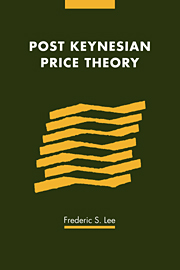Book contents
- Frontmatter
- Contents
- List of figures and tables
- Acknowledgments
- Introduction
- Part I The doctrine of administered prices
- Part II The doctrine of normal cost prices
- Part III The doctrine of mark up prices
- Part IV The grounded pricing foundation of Post Keynesian price theory
- 11 Pricing and prices
- 12 The pricing model, the grounded pricing foundation, and Post Keynesian price theory
- Appendix A Studies on cost accounting and costing practices
- Appendix B Studies on pricing
- Bibliography
- Index
12 - The pricing model, the grounded pricing foundation, and Post Keynesian price theory
Published online by Cambridge University Press: 22 September 2009
- Frontmatter
- Contents
- List of figures and tables
- Acknowledgments
- Introduction
- Part I The doctrine of administered prices
- Part II The doctrine of normal cost prices
- Part III The doctrine of mark up prices
- Part IV The grounded pricing foundation of Post Keynesian price theory
- 11 Pricing and prices
- 12 The pricing model, the grounded pricing foundation, and Post Keynesian price theory
- Appendix A Studies on cost accounting and costing practices
- Appendix B Studies on pricing
- Bibliography
- Index
Summary
Any attempt at developing an empirically grounded theoretical pricing model of the economy based on market pricing equations raises a number of conceptual and theoretical issues, the first of which is the model's relationship to the production schema of real capitalist economies. Some Post Keynesian economists take the position that it is not necessary to specify any production schema underlying their pricing models, others take the view that the pricing model need not bear any relationship to the underlying schema, as in the case when production is depicted in terms of a circular flow of produced goods while pricing consists of simply the marking up of labor costs. Since material and labor inputs are explicit components of mark up, normal cost, and target rate of return pricing procedures, the working hypothesis adopted here is, in contrast to the above views, that the foundation of the pricing model must be closely related to the general schema of production of capitalist economies. This decision brings with it a number of further conceptual and theoretical issues which center on the representation of the production schema. Drawing upon a number of input–output studies (see table 12.1), the principal characteristics of the production schema with regard to the flow and use of intermediate inputs and the differentiation between intermediate inputs and final demand products and among final demand products will be set out.
- Type
- Chapter
- Information
- Post Keynesian Price Theory , pp. 219 - 231Publisher: Cambridge University PressPrint publication year: 1999



